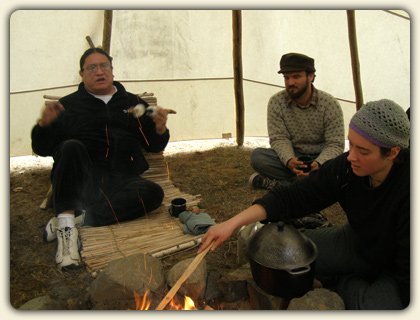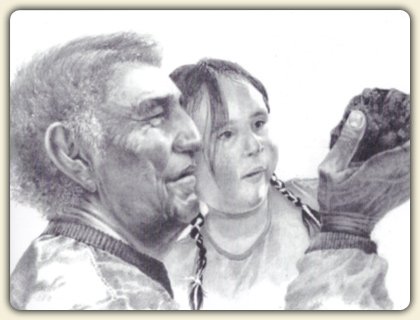Native American Legends
Native American legends form the cornerstone of traditional, indigenous culture. They express people's collective cultural beliefs and literally create culture. They not only affect everyday life but also can steer a whole culture by the morals and ethics contained in them. They have the power to emphasize the timeless bond that humans have with nature. The impacts these stories have on culture are truly endless.

Native American legends keep us awake to what's most important and give people the power to see clearly. Native American legends give us insight into how to change, appreciate diversity, restore peace, provide humor and entertainment, and offer a road map for the routines and rituals which make up life. They are the basis of learning. They teach us not to wander off from what is most essential in life. Truly, Native American legends are what keep culture alive.
- Barry Lopez, Crow and Weasel
What it boils down to is this: Native American legends teach us how to preserve the well-being of the people. They provide a framework for understanding the inherent forces that guide us. They provide inspiration on how to keep something valuable alive both within us and around us. A really good Native American legend can give you all this and more.
Raven and Pheasant
A Puget Sound Canoe Indian Native American Legend
Raven and Pheasant were the judiciaries in their time. Their word was law. One day Raven wanted to prove his expertise in hunting by shooting an elk with a single arrow. He brought along others to witness his hunting prowess.
A bull elk was spotted. "That elk is too far so we'll have to stalk him" one of the onlookers said. "Not for my bow!" declared Raven. Raven drew back on the bowstring and the arrow went flying. It went directly to the big bull elk and swiftly took its life. "May this teach all of you. My skill as a hunter is a mark of my great ability and power. Remember I am your authority and magistrate!" Raven professed.
When Raven got to the kill he approached an unfamiliar person there with the elk. "I am the changer and was sent by the Great Spirit. Can you tell me who owns this elk?" he asked Raven. "Well, it's pretty obvious who own this elk from the swift shot of my arrow! This elk is mine!" stated Raved. "My friend, this is not true. The elk is mine," said the Changer. "Do you dare challenge me?" gasped Raven. "I am the magistrate and if I say I killed this elk with my arrow then clearly it is mine."
"Then tell me Raven, who is the owner of that dog sitting at your feet?" inquired Changer. "The dog is mine." Raven said. "My friend," said Changer, "once again, it is I who owns this dog." Raven responded, "That is ridiculous. This dog has been with my ever since it was a little pup."
"Well then, let us decide who own this dog by the way of a contest. Let us both take a turn at calling the dog to us and whoever the dog goes to will be the true owner. Being that you are a judge, you know what fairness is all about and you will find this to be suitable." said the Changer.
Raven agreed and called the dog first. The dog overlooked him and Raven became heated. Raven at once ran to the dog and it attacked Raven. Then Changer called the dog and it ran up to the Changer, panted and wagged its tail. "You see, this is my dog and my elk.", said the Changer
"How can this be?" asked Raven. "All living things are kept in the care of the Great Spirit", said the Changer. "They are here for you to relate with and use but not to own. You may take this dog home now along with the elk." "How can I believe you?" asked Raven, investigating further. "If after all this you disbelieve me, then when you get home you will see an obvious sign of this wisdom.", said Charger.
When Raven returned home, he recounted the whole story with his wife. They returned to the elk and found it had changed into a log.
This very same day Pheasant had been out hunting elk and managed to kill an elk as well. With Pheasant standing there before the elk there was the Changer asking him, "My friend, who owns this elk?" "It is yours of course, borrowed to me by the Great Spirit", said Pheasant. "Then return home with the elk and host a feast for your family and loved ones.", said Changer.
Many years later Raven and Pheasant were creating the laws of the world, Pheasant's son passed away. Pheasant requested Raven to pass a bill for younger people to have a fuller, longer life. "Don't be silly," laughed Raven. "You are only able to see through the eyes of your son and therefore your judgment is biased. If everyone lived a long life there would not be enough food for everyone." Despite Pheasant's loss, he accepted Raven's statements.
Sometime later Raven's son died. Raven at once approached Pheasant exclaiming, "We must allow our men to live full and long lives. If we don't do this, there will be a scarcity of well-developed clear thinking." "Well, you may be right Raven," said Pheasant, "however when I suggested this same idea when my son died you disagreed and would not have it. I agreed with your law and now it will not be changed."

The Maiden Who Lived with the Wolves
A Lakota Native American Legend
The early Lakota Indians frequently moved their camp on their way to their summer hunting grounds. It took many months of travel to get from their winter camp to their summer camp. Most of the food that was taken with them was eaten only when they could not get fresh meat or edible plants on their journey. If they found food that was abundant, they would gather more to add to their supply.
During one of their stops a young maiden decided to wander farther off to gather food. She became lost and could not find her way back to camp. After a few days she finally found camp but by then, her people had left and she was left to survive on her own.
She felt very anxious at the thought of having to live on her own without her people so she sat down to calm herself and form a plan. It was then that a wolf came by and sensed her anxiety. The wolf came close to her and tried to be friendly. After overcoming her nervousness and fear, she followed the wolf to a butte where the wolf lived with its pack in a den.
The wolf pack welcomed her. It was there that she found a new home with the wolves. She learned the ways of the wolves and they, too learned to understand her as well. They hunted for her and gave her a home through the long winter months.
When spring came, she looked down from the butte and saw a band of people setting up camp. She asked the wolves to scout around their camp to see whether they were her people or not. The wolves did so and when they returned they brought her news that indeed they were her people. With gratitude in her heart she thanked the wolves for helping to take care of her and told them it was time for her to return to her people.
She reunited with her people and told them her story. She shared with them the ways of the wolves and how they had saved her from starving through the winter months. She shared with them the ways of the wolves, their skills of stalking, stealth and of hunting.
Upon hearing this chief said, "The wolves have much to teach us. Whenever our people hunt an animal, they can hunt for others and not just themselves. Everyone in the tribe will benefit, children, widows and elders will always have food to eat."
And so it was that the Lakota have always practiced sharing among people from band to band and generation to generation. The experiences the maiden had with the wolves and the teachings and lessons she gained and shared with her people offered a way for those who could not hunt for themselves to be fed.
Additional Resources for Native American Legends
We all share a common heritage of earth based ancestors. Native American legends provide us a window into traditional culture, and thus a part of ourselves. If you are looking for more stories, be sure to check out our other page, Native American Mythology.
What follows are some additional resources for you to unearth more Native American Legends:
- Native American Animal Stories by Joseph Bruchac
- American Indian Trickster Tales (Myths and Legends) by Richard Erdoes
Interested in being personally mentored in Nature Based Mentoring, on a transformational journey of connection to nature, community, and self?
Check out the Twin Eagles Wilderness Immersion Program.
comments powered by Disqus
Return from Native American Legends to What is Mentoring?
Return from Native American Legends to Wilderness Survival (homepage)
Track Us